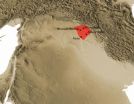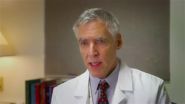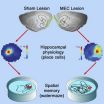(Press-News.org) The Assyrian Empire once dominated the ancient Near East. At the start of the 7th century BC, it was a mighty military machine and the largest empire the Old World had yet seen. But then, before the century was out, it had collapsed. Why? An international study now offers two new factors as possible contributors to the empire's sudden demise - overpopulation and drought.
Adam Schneider of the University of California, San Diego and Selim Adalı of Koç University in Istanbul, Turkey, have just published evidence for their novel claim.
"As far as we know, ours is the first study to put forward the hypothesis that climate change - specifically drought - helped to destroy the Assyrian Empire," said Schneider, doctoral candidate in anthropology at UC San Diego and first author on the paper in the Springer journal Climatic Change.
The researchers' work connects recently published climate data to text found on a clay tablet. The text is a letter to the king, written by a court astrologer, reporting (almost incidentally) that "no harvest was reaped" in 657 BC.
Paleoclimatic records back up the courtier's statement. Further, analysis of the region's weather patterns, in what is now Northern Iraq and Syria, suggests that the drought was not a one-off event but part of a series of arid years.
Add to that the strain of overpopulation, especially in places like the Assyrian capital of Nineveh (near present-day Mosul) - which had grown unsustainably large during the reign of King Sennacherib - and Assyria was fatally weakened, the researchers argue.
Within five years of the no-harvest report, Assyria was racked by a series of civil wars. Then joint Babylonian and Median forces attacked and destroyed Nineveh in 612 BC. The empire never recovered.
"We're not saying that the Assyrians suddenly starved to death or were forced to wander off into the desert en masse, abandoning their cities," Schneider said. "Rather, we're saying that drought and overpopulation affected the economy and destabilized the political system to a point where the empire couldn't withstand unrest and the onslaught of other peoples."
Schneider and Adalı draw parallels in their paper between the collapse of the ancient superpower and what is happening in the same area now. They point out, for instance, that the 7th-century story they outline bears a striking resemblance to the severe drought and subsequent political conflict in today's Syria and northern Iraq.
Schneider also sees an eerie similarity between Nineveh and Southern California. Though people weren't forcibly relocated to Los Angeles or San Diego to help an emperor grow himself a "great city," still, the populations of these contemporary metropolitan areas are probably also too large for their environments.
On a more global scale, Schneider and Adalı conclude, modern societies should pay attention to what can happen when immediate gains are prioritized over considerations of the long term.
"The Assyrians can be 'excused' to some extent," they write, "for focusing on short-term economic or political goals which increased their risk of being negatively impacted by climate change, given their technological capacity and their level of scientific understanding about how the natural world works. We, however, have no such excuses, and we also possess the additional benefit of hindsight, which allows us to piece together from the past what can go wrong if we choose not to enact policies that promote longer-term sustainability."
INFORMATION:
Results of a federally-funded pooled analysis of five prospective cohort studies indicate that cigarette smoking prior to the first diagnosis of lung (stage I), bladder, kidney or head and neck cancer increases risk of developing a second smoking-associated cancer. This is the largest study to date exploring risk of second cancers among current smokers.
An analysis of five large, prospective cohort studies indicates that lung (stage I), bladder, kidney and head and neck cancer survivors who smoked 20 or more cigarettes a day prior to their cancer diagnoses have an up ...
Nestled among a triplet of young galaxies more than 12.5 billion light-years away is a cosmic powerhouse: a galaxy that is producing stars nearly 1,000 times faster than our own Milky Way. This energetic starburst galaxy, known as AzTEC-3, together with its gang of calmer galaxies may represent the best evidence yet that large galaxies grow from the merger of smaller ones in the early Universe, a process known as hierarchical merging.
An international team of astronomers observed these remarkable objects with the Atacama Large Millimeter/submillimeter Array (ALMA).
"The ...
VIDEO:
Dartmouth researchers say lung cancer screening in the National Lung Screening Trial meets a commonly accepted standard for cost effectiveness as reported in the Nov. 6 issue of the New...
Click here for more information.
Dartmouth researchers say lung cancer screening in the National Lung Screening Trial (NLST) meets a commonly accepted standard for cost effectiveness as reported in the Nov. 6 issue of the New England Journal of Medicine. This relatively new screening ...
Imagine being able to recognize your car as your own but never being able to remember where you parked it. Researchers at University of California, San Diego School of Medicine have induced this all-too-common human experience - or a close version of it - permanently in rats and from what is observed perhaps derive clues about why strokes and Alzheimer's disease can destroy a person's sense of direction.
The findings are published online in the current issue of Cell Reports.
Grid cells and other specialized nerve cells in the brain, known as "place cells," comprise ...
Cats and humans have shared the same households for at least 9,000 years, but we still know very little about how our feline friends became domesticated. An analysis of the cat genome by researchers at Washington University School of Medicine in St. Louis reveals some surprising clues.
The research appears Nov. 10 in the Proceedings of the National Academy of Sciences Early Edition.
Cats have a relatively recent history of domestication compared with dogs; canines arose from wolves over 30,000 years ago.
"Cats, unlike dogs, are really only semidomesticated," said ...
A massive new University of Colorado Boulder study indicates there is a statistical link between hotter temperatures generated by climate change and the risk of armed conflicts in sub-Saharan Africa.
CU-Boulder Professor John O'Loughlin led a research team that assessed more than 78,000 armed conflicts between 1980 and 2012 in the Sahel region of Africa - a semi-arid belt just south of the Saharan Desert that spans about 3,000 miles and more than a dozen countries from the Atlantic to the Indian oceans.
The team was looking for links between armed conflicts and temperature ...
HOUSTON - (Nov. 10, 2014) - An analysis of more than 100 health insurance plans across Texas offered under the Affordable Care Act (ACA) shows that plans can differ significantly in premium cost and the number of hospitals included in insurance networks. That's just one of the findings of a report released today by the Episcopal Health Foundation and Rice University's Baker Institute for Public Policy.
The report examined "Silver" health insurance plans offered by insurers within the ACA's Marketplace. Texas is divided into 26 different geographic areas, with different ...
Philadelphia, PA, November 10, 2014 - Beta-blockers have been a cornerstone in the treatment of heart attack survivors for more than a quarter of a century. However, many of the data predate contemporary medical therapy such as reperfusion, statins, and antiplatelet agents, and recent data have called the role of beta-blockers into question. Two new studies published in The American Journal of Medicine evaluated the traditional management of these patients after their discharge from the hospital and in the light of changing medical treatment, as well as the impact of the ...
The adult human body is made up of about 37 trillion cells. Microbes, mainly bacteria, outnumber body cells by 10 to 1. Increasingly, scientists recognize that this huge community of microbes, called the microbiome, affects the health, development and evolution of all multicellular organisms, including humans.
Studies show symbiotic microbes can help prevent infection by disease-causing pathogens. But sometimes the interaction goes the other way, with a pathogen or disease disrupting the normal community of symbiotic bacteria. In a new study, a team of scientists from ...
ANN ARBOR--In a step toward robots smaller than a grain of sand, University of Michigan researchers have shown how chains of self-assembling particles could serve as electrically activated muscles in the tiny machines.
So-called microbots would be handy in many areas, particularly medicine and manufacturing. But several challenges lie between current technologies and science fiction possibilities. Two of the big ones are building the 'bots and making them mobile.
"We are inspired by ideas of microscopic robots," said Michael Solomon, a professor of chemical engineering. ...






